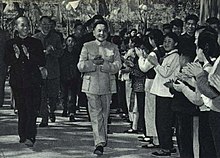Cat theory (Deng Xiaoping)
The cat theory (simplified Chinese: 猫论; traditional Chinese: 貓論) of Deng Xiaoping, the paramount leader of China between 1978 and 1989, is a pragmatic economic philosophy which can be summarized by "it doesn't matter if a cat is black or white, as long as it catches mice (不管黑猫白猫,能捉到老鼠就是好猫)".[1][2][3] Deng argued that, planned economy or market economy is only a tool for distributing resources and has nothing to do with political institution, in other words socialism can have market and capitalism can have planning.[4] The cat theory became widely known within the Chinese society after Deng Xiaoping's southern tour in 1992, and was an underlying ideology guiding the reform and opening of China.[5][6][7]
History
[edit]Initial proposal
[edit]
In 1962, Deng Xiaoping, then Vice Premier of China, quoted a Chinese proverb "it doesn't matter if a cat is black or yellow, as long as it catches mice" as an endorsement for the economic reform policy "sanzi yibao (三自一包, "Three selfs, one contract", household plots, rural free markets, self-financing and fixed output quota)".[8][9] The reform was initiated after the disastrous Great Leap Forward which caused the Great Chinese Famine,[10] while the proverb's origin can be traced back to Strange Tales from a Chinese Studio by Pu Songling in Qing dynasty.[11] On July 7, 1962, Deng elaborated further in an article, "How to recover agricultural production (怎样恢复农业生产)", that:[8][12]
Comrade Liu Bocheng often quotes a proverb from Sichuan, "yellow cat or black cat, as long as it catches mice it is a good cat". That means, the reason why we could defeat Chiang Kai-shek was that we did not follow the old rule or old pattern, but adapting to the specific scenarios. Similarly, in order to recover agricultural production now, we need to adapt to different situations instead of adhering to one fixed pattern in the relations of production. We need to use whatever method that can raise people's enthusiasm.
However, during the Cultural Revolution (1966–1976), the cat theory became one of Deng's "crimes", and he was purged twice by Mao Zedong during the Cultural Revolution.[5][12][13]
Revival and development
[edit]The cat theory was revived after Deng Xiaoping became the paramount leader of China in December 1978, when he and his allies launched the "Reform and Opening" of China.[8][12][14] After the Tiananmen Square Massacre in 1989, the reform and opening program went into stagnation, and there were fears and concerns within the Chinese Communist Party that further reforms may turn China into a capitalist country.[15][16] As response, when visiting Shanghai in 1991, Deng stated that "reform and opening up includes taking over the useful things of capitalism."[2] Eventually, after Deng Xiaoping's southern tour in 1992, the reform and opening program was resumed, and the cat theory became widely known in China and was accepted as the philosophy of economic reforms, but the "yellow cat" in the popular version of the phrase somehow became "white cat".[5][6][12][17]
See also
[edit]- Deng Xiaoping Theory
- Socialism with Chinese characteristics
- Crossing the river by touching the stones
- Boluan Fanzheng
- 1978 Truth Criterion Controversy
- Seven Thousand Cadres Conference
References
[edit]- ^ Jian, Chen (November 2019). "From Mao to Deng: China's Changing Relations with the United States". Wilson Center. Retrieved 2024-10-26.
- ^ a b Zhao, Suisheng (1993). "Deng Xiaoping's Southern Tour: Elite Politics in Post-Tiananmen China". Asian Survey. 33 (8): 739–756. doi:10.2307/2645086. ISSN 0004-4687.
Deng, however, sponsored the "cat theory," namely, that "a cat, whether it is white or black, is good as long as it is able to catch mice."
- ^ Zhang, Xiaodan; Yan, Wenjia (June 2022). "Forty-Years of the Modernization of Chinese Socialist Legality: Strategy, Lacuna, and Outlook". German Law Journal. 23 (5): 691–712. doi:10.1017/glj.2022.43.
- ^ "邓小平:社会主义为什么不可以搞市场经济,这个不能说是资本主义" [Deng Xiaoping: why can't socialism have market economy? This is not capitalism]. People's Net (in Chinese). 2020-01-17. Retrieved 2024-10-26.
- ^ a b c "The great pragmatist: Deng Xiaoping". The Guardian. 2008-12-18. Retrieved 2020-05-01.
- ^ a b Bao, Tong (June 3, 2015). "How Deng Xiaoping Helped Create a Corrupt China". The New York Times.
- ^ Ruwitch, John (August 9, 2007). "China now tries to tame Deng's black and white cats". Reuters.
- ^ a b c "邓小平同志"黑猫白猫论"背后的故事" [Behind-the-scene stories of comrade Deng Xiaoping's cat theory]. People's Net (in Chinese). Archived from the original on 2021-01-02. Retrieved 2020-05-01.
- ^ Xu, Renjun. "邓子恢和六十年代的包产到户试验". Yanhuang Chunqiu (in Chinese). Archived from the original on 2020-06-28.
- ^ MacFarquhar, Roderick (October 1997). "7 The Seven Thousand Cadres Conference". The Origins of the Cultural Revolution: Volume 3: The Coming of the Cataclysm 1961-1966. Columbia University Press. ISBN 9780231110839.
- ^ "邓小平爱读《聊斋志异》 "猫论"源于蒲松龄点评". Phoenix New Media. China News Agency. 2009-07-13. Retrieved 2024-10-26.
- ^ a b c d "邓小平白猫黑猫论开启30年飞速发展" [Deng Xiaoping's cat theory gave rise to 30 years' fast development]. Sina Corporation (in Chinese). Economic Daily. 2008-12-12. Archived from the original on 2024-06-16. Retrieved 2024-10-26.
- ^ "邓小平:我是刘少奇之后"第二号"" [Deng Xiaoping: I was the "No.2" after Liu Shaoqi]. Phoenix New Media (in Chinese). 2007-03-14. Archived from the original on 2022-10-13. Retrieved 2024-10-26.
- ^ Church, George J. (1986-01-06). "China: Old Wounds Deng Xiaoping". TIME. Retrieved 2024-10-26.
- ^ "The inside story of the propaganda fightback for Deng's reforms". South China Morning Post. 2018-11-14. Archived from the original on 2018-11-13. Retrieved 2020-05-01.
- ^ Barron, Laignee (2019-06-04). "How the Tiananmen Square Massacre Changed China Forever". TIME. Retrieved 2024-10-26.
- ^ "Prof. HUANG Yiping: History and Direction of China's Economic Policies". Peking University. 2021-11-29.

